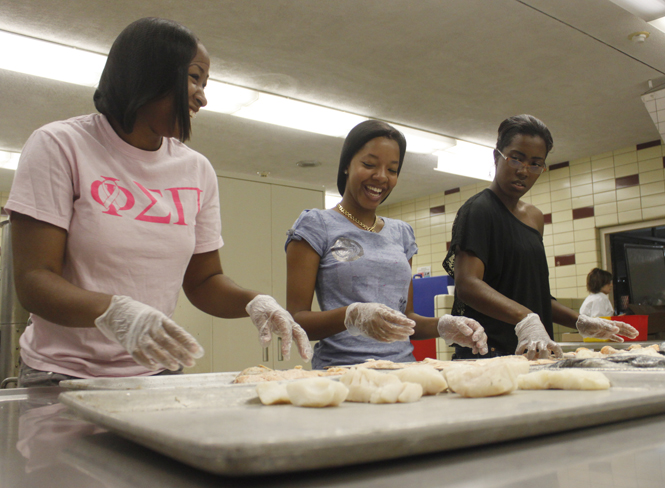Campus Kitchen finds success at Kent State
Every Wednesday at 2 p.m., senior Christine Sweeney goes to the kitchen on the second floor of Beall Hall, puts on a black chef’s jacket and starts preparing meals for 80 people.
Sweeney is the kitchen manager for The Campus Kitchen at Kent State, a volunteer program that collects donated food and turns it into a hot meal for diners of Kent Social Services.
Kent Social Services is a soup kitchen on South Water Street that provides lunch every Monday through Friday and a dinner, prepared by Kent States’s Campus Kitchen, on Thursday.
“My job is to evaluate the food and plan the menu,” said Sweeney, a nutrition and food major. “We have to make an entrée, a starch, a salad, a vegetable and sometimes we make dessert.”
Ann Gosky, adviser of Kent State’s Campus Kitchen, said most of the ingredients are recovered from restaurants, grocery stores and even dining services.
“It’s food that’s still good and can be repurposed,” Gosky explained. “We try to spend as little as possible and rely a lot on donations.”
Campus Kitchen opened at Kent State on Feb. 22, 2011 after Gosky took a group of students, including Sweeney, to Washington, D.C. to visit the D.C. Central Kitchen, the largest homeless shelter in the U.S.
It was there that the group was introduced to The Campus Kitchen program.
Maureen Roche, director of The Campus Kitchen in D.C., said the now-nationwide program began in October 2001 at St. Louis University as a way of expanding the food recovery and distribution process the D.C. Central Kitchen was already doing.
“We didn’t want to take $1 million and sink it into building more kitchens because there are kitchens out there being unused,” Roche said. “Then came the epiphany that there are campus kitchens being unused.”
Roche and Robert Egger, president of The Campus Kitchen in D.C., modified their model of the D.C. Central Kitchen to fit college and high school campuses.
The expanded program will open its 31st kitchen in October 2011.
“We have gone after certain schools, but it’s more often a grassroots thing set up by the students,” Roche said.
Gosky said that’s exactly how the Kent State program came to fruition.
“We wanted to start it because Kent was hit hard by the recession, yet a lot of people were throwing food away,” Sweeney said.
To set up a Campus Kitchen, Roche said a feasibility test must be done, looking at kitchen space, food and a sponsoring office. Then, a community assessment is completed to see where food is wasted and where food needs to be provided.
Christie Anderson, manager of Kent Social Services, said it made sense for Kent State’s Campus Kitchen to provide meals at the South Water Street location.
“We’ve had a relationship with Kent State for many years, primarily through (Gosky) who provides student volunteers,” Anderson said. “We seemed to be the natural entity to benefit because we serve meals to low income residents of Kent.”
Roche said the pre-opening assessment, which includes a site visit and training course from one of The Campus Kitchen’s staff members, can take anywhere from six months to a year to complete.
“It’s a pretty involved process, but at the end of the day, we have a pretty robust program that is doing food recovery and getting food donations,” she said.
The Campus Kitchen provides a grant to each kitchen based on its size.
“Smaller kitchens can get away with $5,000 cash budgets, which doesn’t include donated food, space and dining personnel,” Roche said. “Bigger kitchens, which produce 1,000 meals per week, can take $150,000.”
Cranking out 80 meals a week, Gosky said Kent State’s Campus Kitchen receives a $15,000 grant over three years.
Additional funding comes from Sodexo, the food service provider at Kent State. Gosky said Sodexo gave $7,500 this year for food, cooking supplies, marketing programs, workshops and student manager employment.
After three years of operation, Roche said campus kitchens must pay an annual affiliation fee for $12,000. This goes toward educational, technical and training programs.
“What we’re taking out is really miniscule in comparison to what is put back in,” Roche said. “In 2010, we had 28 operational kitchens, and they put back $3 million of volunteer time and goods back into the community.”
Kent State’s Campus Kitchen is also cutting costs for Kent Social Services.
“It’s saved us 20 percent of our weekly cost, which has been significant for us,” Anderson said. “We use volunteer labor and mostly donated food, so it’s hard to translate it into dollars.”
But Anderson said the money saved has been turned around to provide an extra meal on Sunday once a month.
“We were absolutely thrilled (to receive the meals), especially because it was the students themselves who initiated this,” Anderson said. “The people who eat here have spoken very, very highly of the quality of the meals that have been prepared by The Campus Kitchen. I think it will be an ongoing thing just because of the good hearts of the students at Kent.”
Contact Rachel Jones at [email protected].



